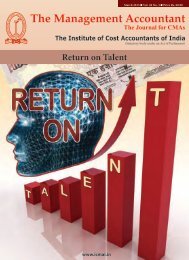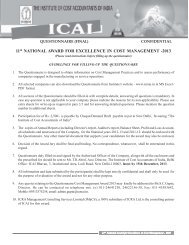This Issue - Icwai
This Issue - Icwai
This Issue - Icwai
Create successful ePaper yourself
Turn your PDF publications into a flip-book with our unique Google optimized e-Paper software.
LEGAL LEGAL EDUCATION<br />
EDUCATION<br />
BCI said that all these pending writ petitions involved<br />
the same/substantially the same question of law and<br />
were pending adjudication. It would be in the interest<br />
of justice that the petitions were transferred to the<br />
Supreme Court.<br />
However, a three-judge Bench of Chief Justice of<br />
India S.H. Kapadia and Justices K.S. Radhakrishnan<br />
and Swatanter Kumar told the BCI counsel that it<br />
would be desirable if the petitions were heard by one<br />
High Court. Accordingly, the counsel said it would<br />
be better if the matter was heard in the Delhi High<br />
Court.<br />
While dismissing the case 4 the Apex Court<br />
observed that a six-month waiting period to attain<br />
the license to practice was not unreasonable and<br />
remarked “Let the legal reforms begin somewhere’’.<br />
The Bench issued a notice and directed the matter to<br />
be listed for further hearing.<br />
Second Generation Reforms : National Consultation<br />
In the National Consultation, various issues<br />
relating to legal education were discussed, e.g., the<br />
objects of legal education, the priorities in legal<br />
education reform, the roles and responsibilities in this<br />
regard of the Government, Bar Council of India,<br />
Universities and Management of Law Colleges; what<br />
makes a system of legal education world class in<br />
competitive excellence and what is the agenda for<br />
educationists, jurists, judges and advocates for<br />
directing the system towards revival and rejuvenation;<br />
given the changes in the role of law-trained<br />
persons, it was also examined how can legal<br />
pedagogy teaching methods respond to the changing<br />
demands, assessed how far they fulfill the demands<br />
of knowledge, skills, attitudes and ethics required for<br />
legally trained persons.<br />
Due to unprecedented and fast changes in the<br />
society and economy, the law curriculum lags behind<br />
and is not sufficiently reflective of the knowledge and<br />
skills required of legally trained persons. Curriculum<br />
development is a continuing process for which<br />
teachers have the primary responsibility. The issues<br />
as to how does the curriculum reflect itself in syllabi<br />
and teaching plans will be the highlight of this<br />
Consultation for improving standard of legal<br />
education in the country.<br />
In order to be able to effectively implement the<br />
reforms in legal education in India, law teaching must<br />
focus on developing students’ critical and analytical<br />
abilities through classroom exercises and training<br />
designed for the said purpose. In order to develop a<br />
framework to bring about these changes, it has been<br />
considered worth to examine the experiences of law<br />
teachers in other jurisdictions and to identify the scope<br />
for implementing effective teaching and training<br />
methods employed successfully elsewhere.<br />
One of the neglected areas of legal education in<br />
the country is postgraduate studies in law and<br />
research. <strong>This</strong> has resulted in poor quality research<br />
output and dearth of quality law teachers to serve<br />
the ever-expanding legal education sector.<br />
Professionalism demands learning at work or<br />
learning by doing under professional supervision and<br />
to keep abreast with professional developments. Most<br />
of the Law Colleges/Law Schools at present are not<br />
adequately equipped for the tasks involved. Recently,<br />
the Directorate of Legal Education, established by the<br />
Bar Council of India, has the challenge to organize,<br />
supervise and deliver continuing legal education to a<br />
million legal professionals, growing by ten per cent<br />
every year. Taking lessons from the Bar of other<br />
developed countries, we will consider the ways and<br />
means by which such partnership can be established,<br />
and can be made functional to the advantage of<br />
practicing professionals as well as of the Law<br />
Colleges/Law Schools.<br />
The legal profession is not a business, rather, it is<br />
a profession requiring certain standards and etiquette<br />
to be followed by its members The fundamental aim<br />
of legal ethics is to maintain the honour and dignity<br />
of the profession, to secure a spirit of friendly<br />
cooperation between the Bench and the Bar in the<br />
promotion of the highest standards of administration<br />
of justice. It includes standards of conduct both of<br />
the members of the profession and the judiciary. The<br />
Bar Council of India has laid down certain standards<br />
of conduct and etiquette of the members of the Bar. It<br />
will be discussed in this Consultation what it means<br />
to be a member of the legal profession and also reevaluate<br />
the ethical standards with a view to<br />
enhancing the level of service provided by the legal<br />
profession to the community at large.<br />
The role of law schools in social transformation—<br />
particularly of the disadvantaged sections envisaged<br />
by the Indian Constitution—will be another major<br />
highlight of this Consultation for purpose of inclusive<br />
growth. It will be examined how can law schools<br />
contribute towards law reform for the marginalized<br />
and discriminated sections of society, and what is<br />
the role of law schools in legal aid services and<br />
administration of justice; and also to make law schools<br />
partners in social transformation, social justice and<br />
inclusive development.<br />
Students in the National Law Schools, upon<br />
graduation, prefer to opt for a career in major<br />
corporate law firms in contrast to a career in litigation<br />
or the Government. At the same time, the demand<br />
for corporate lawyers in light of India’s globalizing<br />
economy is increasing at a rapid pace. The issues for<br />
consideration in this Consultation are why do students<br />
from National Law Schools seem to prefer careers in<br />
corporate law firms; how can the legal education<br />
796 The Management Accountant |September 2011




